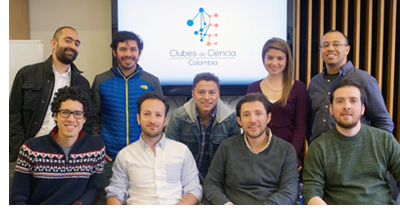Clubes de Ciencia Colombia: Bringing the Experience of STEM and E.I. Research to Young Colombian Students
From Jorge Caraballo
 Picture yourself as a curious young student in one of the poorest neighborhoods of a Colombian city. Your educational options after attending public high school are pretty limited and you’re facing a dilemma: You would like to keep studying, but your family needs resources and wants you to work in something ‘productive.’ One time you said out loud that you wanted to be a scientist, but everybody laughed as if you were joking. Scientist? You? No way! Most of the time you share that skepticism, but one day you meet real Colombian scientists, they tell you their stories, they invite you to do some fun experiments with them, and then your plans begin to change. Picture yourself as a curious young student in one of the poorest neighborhoods of a Colombian city. Your educational options after attending public high school are pretty limited and you’re facing a dilemma: You would like to keep studying, but your family needs resources and wants you to work in something ‘productive.’ One time you said out loud that you wanted to be a scientist, but everybody laughed as if you were joking. Scientist? You? No way! Most of the time you share that skepticism, but one day you meet real Colombian scientists, they tell you their stories, they invite you to do some fun experiments with them, and then your plans begin to change.
That’s exactly what happened to Johan, a sixteen year old student from Medellín, who participated in the first version of Clubes de Ciencia Colombia (Science Clubs Colombia) last year. “I want to study astrophysics,” he told one of his instructors, “but a lot of my relatives say that I shouldn’t do that, because Colombia doesn’t need physics or science, and that it will be even worse for me because of my socio-economic background.” Fortunately, after his experience in Clubes de Ciencia, Johan’s life had an unexpected change.
Johan was one of the 374 students who participated in the first version of Clubes de Ciencia Colombia, a program founded by a group of Colombian researchers in the Boston area who seek to ignite in young Colombians their passion for science, technology and innovation, and in the process create an international network of academic collaborations for the benefit of their country’s social and economic development.
A Club de Ciencia (Science Club) is an intensive, project-oriented, one-week workshop, focused on developing technical and cognitive abilities in a wide array of research areas in STEM+EI fields (Science, Technology, Engineering, Mathematics, Entrepreneurship & Innovation). The Clubs aim to serve as a platform for young students to experience the world of research: conception of ideas, design and execution of experiments, and communication of results. Each Science Club is conducted by an instructor who is a professional researcher affiliated with an international institution, in collaboration with a co-instructor based in Colombia.
After a very successful debut last year, Clubes de Ciencia Colombia will hold its second session this summer from June 20-25, 2016, in 7 different cities in Colombia. Our goal for this year is quite ambitious: Last year we hosted 18 workshops, and now we’re aiming to do 78 thanks to public funding and partnerships.
The program has had a strong impact: 87% of the young students said they desired to go to college and obtain a PhD in their careers. Johan, for example, made a great job during the Club, stayed in touch with his instructors and felt the support he needed to apply to a public university in Medellín, where he was recently accepted into a highly competitive Astronomy program. Thanks to his experience in Clubes de Ciencia, he now feels closer to the dream of becoming an astrophysicist. We hope to provide that support to many other young Colombian students.
We are currently receiving applications from researchers who want to lead one of the Clubs for high school students in Colombia. Though the initial deadline has already passed, we will still be considering applications received by April 26, 2016, on our website: www.clubesdeciencia.co
Click here if you are interested in applying as an instructor (researcher abroad), or here if you want to apply as co-instructor (researcher in Colombia).
All travel and accommodation expenses for selected instructors will be paid by the program.
Jorge Caraballo is a Colombian journalist studying Media Innovation at Northeastern University. He's part of the Communications team at Clubes de Ciencia Colombia.
Pictured in the photo are the Clubes de Ciencia Colombia planning team: Top: Pedro Reynolds-Cuéllar (MIT instructor), Juan Rafael Martínez, Juan Sebastián Osorio, Alejandra Falla (MIT PhD student), Antonio Copete (MIT alum). Bottom: Jorge Caraballo, Maier Avendaño, Andrés Valencia, Andrés Cubillos (MIT alum and post-doc).
Back to newsletter |